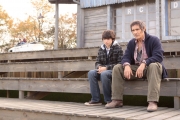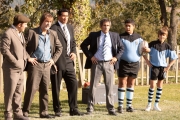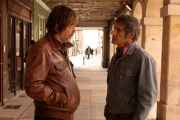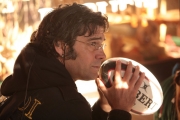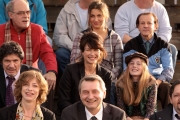Synopsis
Grandson of a rugby legend, son of a legend, and himself a legend of rugby, Jo Canavaro is raising his 13 years old son on his own, Tom, in a small French town. Much to the dismay of Jo, Tom is as good at math as he is bad on the field. For a Canavaro, the legend cannot stop there, even if it means founding a rugby team for Tom against the will of the entire town and that of his own son.
Cast & Crew
Director : Philippe Guillard
Screenwriter : Philippe Guillard
Starring : Gérard Lanvin, Olivier Marchal, Vincent Moscato, Karina Lombard, Jérémie Duval, Pierre Laplace, Lionnel Astier, Laurent Olmedo, Darrens Adams
Schedule & Presentation
![]() Presentation by and discussion with director Philippe Guillard
Presentation by and discussion with director Philippe Guillard
Sunday, April 1 – 12:00 p.m at the Byrd Theater ~ ![]() 1h35 ~ General Audience
1h35 ~ General Audience
More informations
Choose a picture to see the filmography (source : IMDB)
![]()
How was Jo’s Boy born?
In 2001, when I was writing the Shooting Stars screenplay with Fabien Onteniente, the producers asked me for a screenplay about rugby. A little cheeky, I told them that I already had an idea for a movie but that I would have to be the director. At the time, I had just met Gérard Lanvin and I thought he would be perfect for the character of Jo Canavaro. One day during lunch, I told him the story I had in mind. Two hours later he called me back to tell me he wanted to star in the movie. Unfortunately, the producers backed out for several reasons. I told myself it was a nice dream and put my screenplay back in the drawer.
What good fairy allowed you to take it out again?
There were several. First there was actor Vincent Moscato who introduced me to Olivier Marchal in 2005. I jumped on the opportunity of a dinner to hand over to him the screenplay of Jo’s Boy. The story touched him but nothing happened until 2008 when, a little tired of making crime films, he called me and said he wanted to reread the screenplay. Three hours after having given it to him, I got a phone call: he wanted to direct the movie. Meanwhile, on the movie Disco, a friendship was born with the producer Cyril Colbeau-Justin, Olivier’s producer since his first steps, and who, since we first met, has encouraged me to do my first feature film. That is how all of these “big brothers” bonded. The film was finally going to happen. I was so happy that I was willing to give up my dream of directing it and let someone else bring it to the screen.
What changed the deal?
One day, I told Olivier and Cyril the genesis of the project, my meeting with Gérard and how I saw the film. Olivier then said to me: “It is yours to direct, or else you will regret it your whole life. We will be the producers.” It was midnight, and I told myself that the troubles were going to begin.
Rugby holds a significant place, but, in your opinion, is it the core of the movie?
It is just about love. That of a clumsy father who does not understand his son despite his boundless love for him. And that of brothers without a family, united and reunited by rugby.
How did you prepare yourself to direct your first feature film?
Just like you prepare for a battle. I had to be at my best. Thanks to the storyboard that I made by locking myself up in a hotel room in Conques for 15 days and thanks to the pre-production work with the director of photography, I knew exactly where I was going to put the camera for each scene, which allowed me to detach myself from the technical work during the filming to be closer to the actors. I needed to do it. I think I never really sat on the chair marked “director.” I found that I did not deserve the title.
What, for you, were the traps to avoid?
Above all, trying not to tell the story in the context of high-level rugby. In choosing to shoot kids, I got rid of all cinematographic references and made my story credible. I also did not want to fall into the cliché of rugby being “the sport of the southwest of France”. Hence the subtle accents! Even though we filmed in Tarn, I also chose a spot that looked like the center of France, so that everyone could identify.
What was the trickiest?
Finding Tom. We needed a kid who would inspire affection and show that he is emotionally scarred because the character grew up without his mother. It took a while to find him. I narrowed it down to four boys. Jérémie Duvall was not one of them. It is the casting director who said I should see him again. When I asked him to recount the best and the worst moment of his life, I realized that the kid had baggage, that he had depth. He laughed. He cried. He was handsome. He looked like Lanvin. He was the one I was looking for.
Women stay in the background. Why?
It is true, but I would not have achieved my goal if I had put them in the front. They highlight the fragility of men. I hope to touch women through these guys who are a bit surly, tender, lonely and lost. It is a story about men for women who love men.
To what extent did your past as a rugby player serve you on set?
Rugby and cinema are both team sports. Each member of the team was competent; I just had to get them to play together. My concern was for everyone to be happy to be there, for everyone to be all fired up both when they arrived in the morning and when they left in the evening.
How did you get there?
I had brought a rugby ball in my luggage. This ball was our mascot. It did not stop moving from one to the other. Technicians, actors, boys and girls tried the drop kick or the spiral pass. Everyone touched the ball and played with it. We were a great rugby team of 50.
Is the film an autobiography?
I have never experienced this kind of relationship neither with my father nor with my son, who plays soccer. Actually, it was at one of his games one day that I witnessed a scene both pathetic and funny where a father spent his time scolding his son for letting a goal in. I had found my storyline. Jo gives up hope with Tom because he is not good at a sport in which he, and his father before him, excelled. Rugby is a family sport where the ball is passed from one generation to the next.
This film exudes nostalgia. Is this also characteristic of rugby players?
We constantly carry it with us. It is the opportunity to remind ourselves that who we have become is the result of who we used to be. I, as a matter of fact, am particularly nostalgic. The future does not appeal to me, I do not even know if I’ll be part of it! I have plenty of nostalgia at home. I keep everything from metro tickets and journals to answering machine tapes from 1984 to 1990, when I was playing for Paris’ Racing Metro 92 club. When I listen to these tapes, these voices, all that wild youth comes straight back to me, I relive my past.
Do you realize that this first film gives you something in common with Clint Eastwood?
The big difference is that he won several Oscars. I, on the other hand, only have a Gérard (an award for the worst actors and films of French cinema of the year), which is not bad in itself.
What did you like about the script?
Before all, I had to keep my word. Between Shooting Stars and Camping, Philippe came to me and told me about his wish to make a film about rugby and more specifically about a father who does not understand that raising a child means helping him to become what he is and not what you want him to be. It is called love. In his work with Onteniente, I appreciated Philippe’s sensitivity. I told him “you’re on” and I only have one word.
Was it a man’s bond?
Exactly. Philippe and I share the same values in life such as loyalty, friendship, and respect for others. Those who share such principles recognize each other immediately.
A legacy of your rugby past?
Yes, among other things. I played rugby for 10 years. At the time, we played on rutted fields and the teams were very heterogeneous. Between 12 and 18 years old, I remember having played against 20 to 30 year old men. Imagine the bruises I had. But every Wednesday, I met my friends for practice with the same excitement. Despite the cold, the mud, and the occasional pain, I remember the moments of grace we shared, first on the field and then, after the game. Philippe and I wanted to evoke this world.
Did you take part in the screenplay?
I only do that when I can bring something constructive, to try and make the character denser or give it more depth. Reading the screenplay yields desires, ideas. But my role here was mainly to call him regularly to see how he was doing and to support him in this lonely, long and sometimes painful work that writing is.
How would you summarize the movie?
It is not a funny movie but one that makes you laugh. It is not a sad movie but one that makes you cry. It is a simple and touching story that reminded me of Billy Elliot, a movie that I love. I like English movies, actually. The outline is the same here, with a child who is going to encourage his dad to reflect on his own values. Jérémie Duvall knew exactly how to convey that. The secret for being a good actor is to share with others. This feeling lasted the whole movie and inspired us. Notably, I think of Vincent, who had a real challenge to face. The role that Philippe wrote for him was really tricky, but thanks to his personal experiences and the sense of unity that rugby gave him, he is great as Pompon. A true playmate, caring and generous.
What does it take to be a good rugby player on screen?
Your partners help you to be more credible. But the movie is not about rugby players, it is first and foremost the story of a family whose psycho-rigid yet vulnerable father I play. My job was to portray him as a man who is acting wrong but who is not a moron. He is a traditional man, who does not expect a lot and who is satisfied with what he does. It will take the rebellion of his son and the destabilizing intrusion of a woman to force him out of his world.
What characterizes Jo Canavaro’s attitude to women?
Jo has not been interested in sex since the death of his wife, who passed away in a car accident after they had a fight. Since her death, he has lived with an overwhelming guilt and has withdrawn himself in his emotions. Plus, he has his son. How could they possibly bring a woman into their world? It is easier for him to be single. Besides, the situation does not frustrate him at all. At first, Jo is wary of the stunning Alice Hamilton (Karina Lombard). She represents a risk – that of an intimate upheaval for which he is not prepared.
He is the antithesis of his best friend, Chinky…
Which is the reason why they get along so well. Chinky is as extroverted as Jo is introverted. Back to Doumiac after ten years in New Zealand, he conveys joy to others. Rugby players live on the pain of the effort first, then on the happiness of life and sentimentality. That is what happened on and off the set. We spent two and a half months thoroughly enjoying each day and trying to solve the world’s problems at 8:00, 10:00 or later at night around dinner. I must admit, we were helped by a couple of bottles. I think I counted at least a thousand of them by the end…
Your complicity with Olivier Marchal is obvious on screen, but where does it stem from?
It is because we made up. Oliver and I had a falling out over 20 years ago. It happened after I had been rejected once again by the cinema industry; I was shooting a low budget television series in order to feed my family. He was still a cop but he was regularly bringing scripts to Hamster Production. I was asked to read one of them and I said it was crap. He heard about it and did not take it well. When Le Fils à Jo arose, we really needed to talk since we were about to play together. We met, we discussed and now we are inseparable. He thinks that we have lost 20 years of friendship. But I think that until now, we weren’t ready to make amends.



